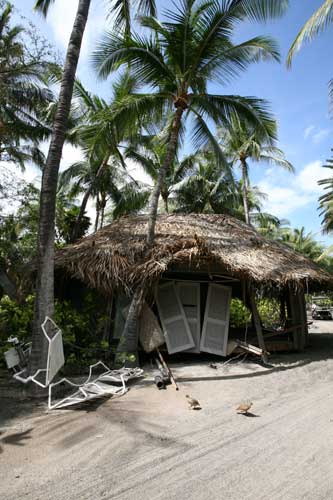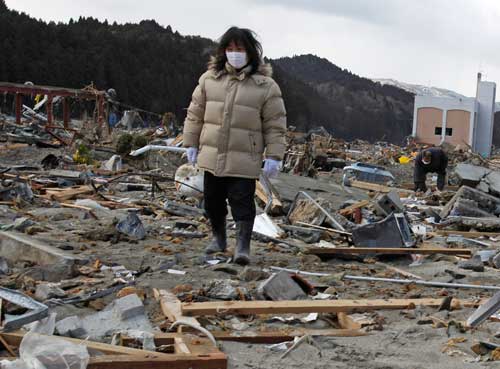Disasters sap tourism

One of the bungalows at the Kona Village resort lies in a shambles following last Friday’s tsunami generated by the massive earthquake off the coast of Japan.

A woman searched for her missing husband in Minamisanriku, Miyagi Prefecture, today.


Tourist arrivals in Hawaii have slowed as problems from the Japanese earthquake and tsunami continue to unfurl and radiation concerns mount.
Booking slowdowns from U.S. travelers, Hawaii’s main visitor market, are adding to damage brought about by thousands of cancellations from Japan. Some members of the state’s visitor industry also are concerned that travel could drop from the emerging China and Korea markets because much of Hawaii’s business from there depends on flight connections in Japan. And, outbound travel sellers are feeling the pinch, too, as Hawaii residents cancel trips to see Japan’s famous cherry blossoms.
Starwood Hotels & Resorts anticipates bookings for April and May in Waikiki will come in 25 percent to 30 percent lower than anticipated, said Keith Vieira, senior vice president and director of operations for Starwood Hotels & Resorts in Hawaii and French Polynesia.
The chain has experienced thousands of cancellations, especially on the group side, from Japan, Vieira said. The Hyatt Regency Waikiki Beach Resort and Spa, the Hilton Hawaiian Village and Outrigger Hotels & Resorts also have reported significant Japan decreases.
"In general, the second quarter will take the biggest hit," said Danny Ojiri, vice president of sales and marketing for Asia Pacific for Outrigger Enterprises. "Nothing will move in April because of all that is happening."
Japan Airlines has experienced a 10 percent decrease in passengers to Hawaii through the end of March, said spokesman Winston Lee.
Don't miss out on what's happening!
Stay in touch with breaking news, as it happens, conveniently in your email inbox. It's FREE!
"Until the rolling blackouts, shortages of food and supplies improve, people are not going to board planes," Ojiri said. "What’s happened in Japan is so high profile that it will affect the Asian business going through Japan, too."
Golden Week, one of the top three travel periods for Japan, had been expected to peak — with growth in the high double-digits — from April 29 to May 3.
"Now we are waiting to find out the extent of the softening," Ojiri said. "We’ll know more next week when the guarantees come due."
The drop in the Japanese market, which supplied about 17.3 percent of 2010 statewide visitor arrivals, will have broader impacts. Even more troublesome, however, are the signs of a downturn in the U.S. market, which totaled nearly 65 percent of all visitors to Hawaii last year.
"In the last few days, we’ve seen leisure business lost from the U.S. mostly related to nuclear concerns," Vieira said. "It’s from all the comments being made about a nuclear fallout in Japan and their belief that Hawaii is closer than the West Coast."
The pattern will hurt Hawaii if it continues, he said.
"This market is our largest, so it has much more potential to hurt us," Vieira said. "Everything is very uncertain now."
Pleasant Holidays, Hawaii’s largest wholesaler, saw cancellations rise when three of its partner hotels, the King Kamehameha’s Kona Beach Hotel, the Kona Village Resort and the Four Seasons Hualalai, sustained significant damage, said Jack Richards, president and chief executive officer of California-based Pleasant Holidays LLC.
Bookings began to slow some this week as travelers were bombarded with stories about the radiation scare in Japan, Richards said.
"This is the first week that we’ve seen a slowdown in demand," he said. "There’s no question that Hawaii is now losing some business to Mexico and the Caribbean."
The Associated Press reported yesterday that 1,000 worried Californians flooded a state hot line for radiation concerns even though the U.S. government and scientists have said radiation from Japan won’t endanger people on the West Coast. The same panic is hitting some travelers, Richards said.
"I thought we were pulling out of this thing, and then this happened," he said.
Isle travel sellers are losing revenue as locals cancel their trips to Japan.
Peter Kobayashi, vice president of Kobayashi Travel Service Ltd., said the company lost $500,000 in sales when six tours to Japan were canceled.
"We gave them the choice to rebook in October, but it’s not far out enough for them to commit," Kobayashi said. "The scale of the earthquake and the radiation are just too big."
Marc Shimamoto, owner of Travel Ways Inc., also has seen cancellations from Hawaii residents who had planned to make trips to Japan, Hong Kong and China.
"They canceled because of the radiation problem," Shimamoto said.
Others "just didn’t feel that it was right to travel to Japan when so many people are suffering," he said.
"There’s been a significant impact on business, and it’s going to get worse than it is now," Shimamoto said.
Richards said he hopes that remarks made from the White House yesterday by President Barack Obama will restore traveler confidence.
Obama said, "We do not expect harmful levels of radiation to reach the United States, whether it’s the West Coast, Hawaii, Alaska or U.S. territories in the Pacific."
Meanwhile, members of Hawaii’s visitor industry are working to get the message out that the state is open for business and that it’s safe to travel here, said Brad Mettler, director of marketing for the Hyatt Regency Waikiki Beach Resort and Spa.
"We were experiencing good growth in the spring, but this will affect that for at least a few months," he said. "Spring is important, but there’s still room for recovery if the damages are contained to a few months."
Star-Advertiser reporter Kristen Consillio contributed to this story.

 Holy Week & Easter in Aiea || Free Events for All at OSHi! ️️
Holy Week & Easter in Aiea || Free Events for All at OSHi! ️️

